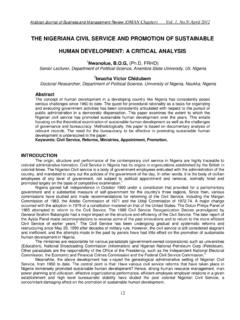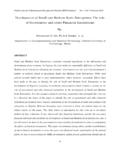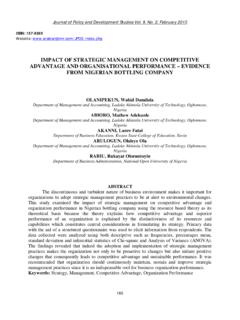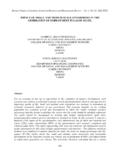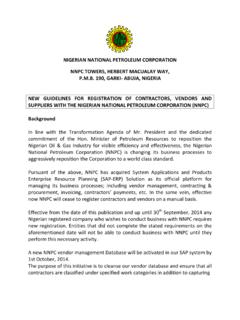Transcription of AN ANALYSIS OF PROS AND CONS TREASURY …
1 Arabian Journal of Business and Management Review (OMAN Chapter) Vol. 5, ; November. 2015 20 AN ANALYSIS OF PROS AND cons TREASURY single account POLICY IN NIGERIA Eme, Okechukwu Innocent Chukwurah, Daniel C. Department of Public Administration and Local Government University of Nigeria, Nsukka & Nnamdi Azikiwe University, Awka E-mail: Emmanuel N Iheanacho Department of Political Science, Imo State University, Owerri E-mail: Abstract The objective of this paper is to discuss the objectives, pros and cons of a TREASURY single account recently introduced by the Buhari administration. The adoption of a TREASURY single account (TSA) by the federal and some state governments is seen by many as aimed at plugging loopholes in the Nigerian Financial System.
2 A TSA is a unified structure of government bank accounts enabling consolidation and optimal utilization of government cash resources. It is a bank account or a set of linked bank accounts through which the government transacts all its receipts and payments and gets a consolidated view of its cash position at any given time. This presidential directive would end the previous public accounting situation of several fragmented accounts for government revenues, incomes and receipts, which in the recent past has meant the loss or leakages of legitimate income meant for the federation account . It would be recalled that President Muhammadu Buhari had earlier promised state governors at the inaugural meeting of the National Economic Council, NEC, in June, that all revenues prescribed for lodgement into the federation account will be treated as such under his watch and that he will ensure strict compliance with all relevant laws on accounting, allocation and disbursement.
3 The paper explores the various gamut of TSA and concludes by positing that for an administration that has unwritten social contract signed with Nigerians in terms of service delivery; it has the obligation to aggregating states resources to provide services and amenities promised to the people. Any step taking in the direction aimed at plugging leakages in revenue generating agencies should be seen as a step in the right direction. Keywords: TREASURY single account , Revenue leakages, incrementalism, Corruption & Nigerian Financial System. Arabian Journal of Business and Management Review (OMAN Chapter) Vol.
4 5, ; November. 2015 21 Introduction The Federal Government s directive to all revenue-generating agencies to close their accounts with commercial banks by February 28, 2015 and transfer same into a Consolidated Revenue Fund of the Federation and TREASURY single account as a new electronic revenue collecting platform introduced recently by President Buhari has continued to generate debate across the country. The Febuary directive, according to reports, was due to the speculation in the banking sector that shareholders lost about N573 billion in 2014 financial year following massive sell-off that overran the market in the last two quarters of the year.
5 According to the Accountant General of the Federation (AGF), Mr. Jonah Otunla, the new Electronic Revenue Collection (ERC) platform is aimed at improving internally generated revenue in the face of declining oil prices. This, he said, was in line with a series of TREASURY reforms, which began in 2012, aimed at ensuring transparency and accountability in the management of the nation s finances. Director, Funds, Office of the Accountant General of the Federation, Mr. Mohammed Dikwa, who spoke on his behalf, posited that henceforth, government revenues would now be paid into the CRF/TSA, as it is now difficult for MDAs to maintain revenues with commercial banks.
6 According to him, with the coming of e-collection, MDAs can no longer maintain Revenue Bank Accounts (RBA) with commercial banks. They are therefore advised to transfer any outstanding balance in your RBA to the CRF and immediately commence processes for closing them. MDAs are given up to February 28, 2015 to close their RBAs, stressing that appropriate sanctions shall be applied against any MDA that fails to comply. This directive was not implemented till recently when the Presidency re affirmed his commitment in enforcing this policy. However, speaking on the feasibility of the system, a development economist and financial analyst, Mr.
7 Odilim Enwegbara, said there was need to overhaul the Fiscal Responsibility Act (FRA) of 2007 in a way that blocks the huge leakages caused by certain sections and subsections of the Act. He said, I am particularly concerned with how Section 22(1) which, mandates all the revenue generating Ministries, Departments and Agencies (MDAs) to remit 80 percent of their operating surplus to the Consolidated Revenue Fund account , allowed these MDAs to fraudulently resort to driving their so-called operating costs so high. By driving their operating costs so high, it allows them to declare close to zero operating surpluses and as a result, 80 per cent of their remittance to government TREASURY becomes close to zero naira(Okwe, ,2015:52).
8 He argued that, This singular lacuna has made it possible for revenue generating MDAs to have reportedly generated trillion in 2009, but only remitted billion to government coffers; generated trillion in 2010 but remitted mere billion; and generated trillion in 2011 and just remitted a meager billion. He cited the case of NNPC and its subsidiaries, which, having internally generated trillion between 2009 and 2011 remitted zero naira to the government TREASURY (Okwe, ,2015:53). Another accounting fraud he pointed out was the one committed by the Nigerian Communications Commission (NCC), which had two different audited accounts one with lower figures sent to the Fiscal Responsibility Commission (FRC) and another with higher figures sent to the Office of the Auditor General of the Federation (OAGF).
9 Enwegbara also Arabian Journal of Business and Management Review (OMAN Chapter) Vol. 5, ; November. 2015 22 cited the fraud discovered during a close examination of the Federal Inland Revenue Services (FIRS) presentation showing how in its 2009 audited accounts, million was found in the audited account forwarded to FRC while N323 million was found in the same audited account it sent to the Office of the Auditor General of the Federation. Listening to the presentation by the Chairman of FRC at a hearing organised by the House of Representatives Committee on Finance in January 2013, he said it was unbelievable to hear the Chairman recount how these agencies were fraudulently diverting government funds.
10 He lamented that Nigeria s MDAs were defrauding the nation s commonwealth. Enwegbara advocated the need for the Federal Government to send a bill to the National Assembly requesting the amendment of this controversial Section 22(1) of the Fiscal Responsibility Act of 2007 to stop the ongoing fraud that costs the nation trillions of naira in revenue. I went as far as suggesting then that the amended Fiscal Responsibility Act should mandate all revenue-generating federal agencies to open a Consolidated Revenue Fund account they should have a drawing right to (New Telegraph Editorial,2015:17). Given their statutory responsibility toward remitting the generated revenue to support government s efforts in reducing the country s recurrent deficit, how could they go ahead to violate with gross impunity the Constitution of the Federal Republic of Nigeria, which clearly states that government can never spend any money without appropriation.
